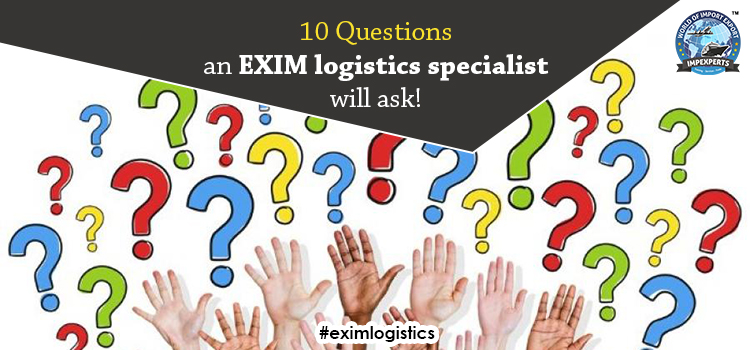If you are a regular reader of our blog series, you might have read on the topic ‘Warehousing and Logistics’. It was one of the most generic blogs covering the detailed information on the responsibilities of the logistics department. Today, we have come up with something more technical and straightforward.
The success of your import export business entirely depends on the transport of the goods or products from one country to another. Before reaching out to the transportation manager or logistics expert, you need to have the answers to the following questions.
Questions an EXIM Logistics Specialist Will Ask
1: Is your commodity perishable or non-perishable?
This is one of the basic things that an EXIM transport or logistics specialist will ask you when you approach them for the transport of your goods.
There is a difference between shipping a banana and a screwdriver. Some goods are perishable, whereas some are not.
You have to take care of the perishable items and have to ask for the frozen facility or deep fridge during the transport to make your goods reach safely to the exporter’s destination.
In short, the temperature standards need to be maintained and discussed before shipping the goods from the origin.
2: What is the commodity number of your product?
Commodity number is basically the HS code schedule B description of your product. There is a handy diary available in the market regarding the updated 6 digit HS code of the import export products. The HS code is universal for all the countries in the world.
These codes are introduced for the easy classification of your products for the customs officer. The shipping quote of the transportation depends on the commodity number as there are different transport rates for different types of products in EXIM industry.
3: What is your preferred shipping mode?
The EXIM logistics specialist will ask about the mode of shipment as per your product’s nature and priority. There is a huge difference in time when you choose the transport mode rail, air or ship.
Depending upon the requirement of your product type, i.e. perishable or non-perishable, you have to choose the transport mode.
E.g., if you are exporting fruits or vegetables, you got to choose the mode that helps your product in reaching faster without damaging the condition or freshness of the food.
Likewise, when you are exporting the machinery or electronic items, there are no risks attached to it related to the perishable nature of the goods.
4: How many cartons are you shipping?
The EXIM logistics specialist will ask about the numbers of cartons that you wish to export from the origin. The numbers of the cartons are further tallied at the receiving port.
E.g., the numbers of cartons shipped from destination A must be received by the importer at port B in equal numbers.
5: What are the size of your cartons?
The size of the cartons includes the height, width and length of the cartons that you wish to export from the origin. Some logistics expert also measures in cubic metres.
6: What is the exact weight (net and gross) of the cartons?
The logistics expert will check both the net and gross weight of the product before it is shipped from the origin.
Gross weight = weight of the product
Net weight = weight of the product, including the carton.
7: Do you wish to stack the cartons?
Stacking the cartons will require prior information about the load in each pallet of carton stacks. It helps the logistics or transport expert to calculate the weight of loading.
8: Do you have the required amount of products to fill the container?
A carton has a specific cubic meter space that is to be filled by the products. If your products are not enough to fill the container, then some other products will be loaded in the same container before shipping.
A seal is designed on the door to separate the products of two companies or more that are placed inside the same container for occupying 100% space of the container.
9: Before exporting, does IEC is compulsory to obtain?
The import export license is the basic requirement of the EXIM business trade. Without the IEC, you cannot successfully send your products to the importer of any country.
You can obtain IEC by consulting to our EXIM Einstein; you can either visit www.impexperts.com or can call at +91 9211066888.
10: What will be the location from where the product will be moved?
The supplier’s destination, i.e. the factory where the goods are being manufactured is the destination from where the product is being moved.
Once, all the information is provided by you to the EXIM logistics expert, he or she or the company will get back to you with a perfect quote. The quote will be according to the type of products that you wish to export.
Also, you can contact more logistics expert to get more numbers of quotes and can compare it while choosing one appropriate expert for your transportation of goods.
We at Impexperts have a separate logistics and warehousing channel for which we help our clients to ship the products one origin to another. You can email us at info@impexperts.com for more details. Also, you must read our previous article on logistics and warehousing for getting the generic information on this topic.
P.S. The more prepared you are with the answers, the more benefit you will get via the quote.








